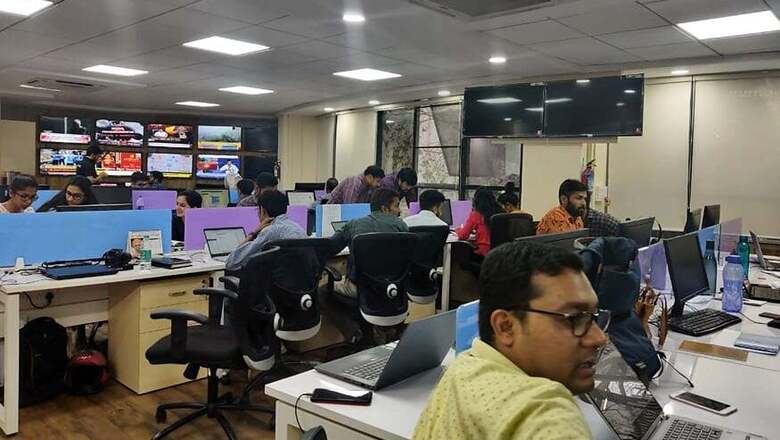
views
"Is that true?"
This is the question that got asked almost 5,000 times last week in Karnataka, in a Telegram app group run by the state information department. Greater than the COVID-19 pandemic, it is now the fake-news pandemic that is reaching alarming proportions in the state known for its large IT workforce.
There can be many writers who post explanations to frequently asked questions on a variety of topics, but this is one question that most hit a stumbling block at. Because the 'news' that preceded the question 'Is that true?' changed every time.
Messages ranged from "There is corona in Yelahanka" to "Whole Sadashivanagar is on quarantine, no people and traffic to move on Malleswaram 21st Cross" to "Section 144 to be imposed across the country, just got a copy of today's presentation". (Leaves one wondering who is that magician who got a copy of the Prime Minister's presentation).
The most bizarre one took the city of Bengaluru by storm on Thursday: "Hello, everyone in Bangalore kindly request you not to come out of your house after 10 pm tonight till tomorrow 5 am, as there will be spraying medicine in the air in order to kill the COVID-19!"
When someone extrapolated this viral message from WhatsApp to Twitter, the information department head Captain Manivannan had only one thing to say: "If this is true, then I am Spider-Man!"
An IAS officer who heads both the labour department and the information department, fighting fake news head-on through the 'Janasnehi' wing was his brainchild. The Janasnehi wing is basically a social media gateway for all citizens to connect with the right department for their grievances. But this past week, it has mostly been converted into an official COVID-19 myth-busting and fake-news-debunking wing, ambushed as they have been with all the rumours over this one pandemic.
On the second floor of the information department, this quiet bunch of about 50 officials and volunteers is quietly tapping away on computers to check and cross-check every feed that comes in on the Telegram group that has been launched for coronavirus fake-news busting last week. In a week, over 15,944 members have joined the group, hoping to get true information from the government in these times of pandemic panic, rather than go by what their uncles, neighbours and school alumni groups are forwarding.
"We are getting a lot of panic queries," says one of the coordinators of Janasnehi, who wished to remain anonymous. "They see some headline on local channels and want to check whether the bus they travelled in was infected with the virus. And if there is no system to check the fake news, it spreads with great hype and with greater ramifications."
The effort was not enough, the department soon realised. Though there are people on the job 24/7 (there have been panic queries even at 2 in the night), and they have been dutifully cross-checking information from relevant departments before reassuring the query-seeker about the misinformation, they've realised that the disease of fake news has spread across all districts now. Starting Monday, a group of citizen-led volunteers called 'Corona Warriors' is being trained to do diligent fact-checks from all taluks and all corners.
About 1,200 such volunteers are being enlisted so that there will be 300 people 'on shift' at any point of time, says deputy director of information Pallavi Honnapura. "We once had someone calling us to check whether all passengers who had travelled from Bangalore to Maddur (a town about 80 km away) should get themselves tested. That was because there was a rumour on one of the Kannada channels that a patient had died in transit on this route in a bus. There was no death here, but there were so many queries," says Honnapura.
She and her colleagues have been putting in hours as late as 10 pm to battle the monster of fake news. Some of the work is to send immediate messages and letters to departments like the Bruhat Bengaluru Mahanagara Palike to immediately put out clarifications to stem the spread of falsities. About two hours after the message on 'spraying chemicals,' for instance, the BBMP commissioner had issued statements about not believing such news.
There will be officials coordinating this mass of information — and misinformation — of course, but the department will actually enlist citizen volunteers to check rumours from the ground. Besides, there are doctors enlisted on this group who are taking turns to answer queries first-hand — about how a concoction of ginger and vinegar cannot really keep the virus or the doctor away. About 16 doctors work in shifts of three hours each — and at the beginning of every shift, they ping in to say they are on hand to put to rest all doubts.
Colleges are closed in the city for at least two weeks, and students from some colleges have volunteered to join the 'war room' of sorts. Samhitha V, a law student from the BMS College, heard about the need for volunteers from her mother who works in the Vidhana Soudha (the state secretariat). She and her friends — Sowbarnika S, a student of psychology, and Gowri KS, an engineering student — land up every morning at 9 am to the Janasnehi centre.
"We monitor the Telegram group. There are thousands of people on it (it's a group open to the common citizen for queries on COVID-19) and everyone has doubts," says Sowbarnika.
"Either we clarify them if we know the answers right away, or check with the department — for example, transport or BBMP — and revert to them. Either way, we revert immediately. And we constantly remind them to not believe anything until it is officially communicated,"
Someone once said that a lie would have travelled around half the world, while the truth is still putting on its shoes. This core group is trying to ensure that the distance the lie covers is at least limited to as little as possible, before they revert with the truth.
"The other question everyone wants to ask is, if they must get themselves tested. And if so, when and where. So many of them want to test themselves just to confirm they are healthy," says a coordinator.
The fear is that if all health resources go into pandering the 80 per cent who want to check they are fine, the 20 per cent who really need to go through a testing process and take remedial measures may lose out on the resources.
As for those smart alecs who have put in all their energies in thinking up these messages that have gone viral, a senior information department official has one thing to say: "These pranks will boomerang on you. They will come back and hit you one day."



















Comments
0 comment